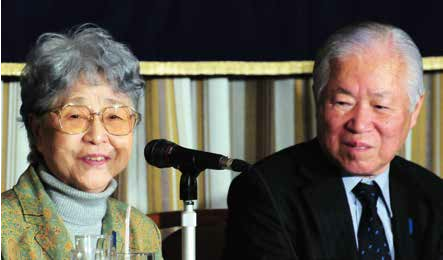Issue:
After 37 years, the parents of the young woman abducted by North Korea are still waiting for proof of her fate

Sakie and Shigeru Yokota hope that baby steps will help to bring their daughter home.
No strangers to press conferences at the Foreign Correspondents’ Club of Japan, the parents of Megumi Yokota appeared on March 24 to relate their bittersweet meeting in the Mongolian capital of Ulan Bator earlier in the month with their granddaughter, Kim Eungyong, and their 10 month old great granddaughter. They also explained why they had gone back on their previously firm policy of refusing invitations to meet Megumi’s daughter, rooted in concern that visiting Pyongyang might be held up by the regime there as a tacit admission that they accepted their daughter is dead.
As both emphasized, they will never make that admission until they are shown undeniable proof.
“I am 81 now and we felt very strongly that we do not have much time left, and that was one of the biggest reasons why we decided to go and meet our granddaughter,” said Mr.Yokota.
“We felt that by taking this action, it might stimulate the restart of exchanges between the Japanese and North Korean governments,” he added. “Bilateral talks were scheduled to take place in Beijing in April, but those have been brought forward to late March and will include discussions on the abduction of Japanese nationals.
“We believe we made the right decision to go and visit our granddaughter,” Mr. Yokota said.
The disappearance of Megumi, then aged 13 as she walked home from school in November 1977, was initially a mystery. And while there had long been rumors that North Korean agents were abducting unsuspecting Japanese nationals from isolated spots on the Sea of Japan coastline, it was not until 2002 that Pyongyang came clean on the activities of its agents.
To date, 17 Japanese nationals are officially listed as having been kidnapped while supporters of the relatives of the missing say that as many as 300 Japanese may have been taken in the 1970s and ’80s in a program to train North Korean agents in the Japanese language and customs.
In 2002, North Korea admitted kidnapping 13 Japanese. Pyongyang later permitted five of the abductees to return home but said the rest were dead, insisting that Megumi committed suicide on March 13, 1994. The Yokotas have never accepted that explanation and demanded proof. North Korea subsequently returned what its officials said were her cremated remains, but DNA tests conducted in Japan proved the remains were those of a male.
The Yokotas have continued their campaign to find their daughter, buoyed by tantalizing reports that she is still alive. Some North Korean government documents given to a support group for relatives of South Korean abductees indicate Megumi was alive as recently as 2004.
With no news and no form of leverage over the North Korean regime, the Yokotas decided in early March that their only option was to meet the granddaughter they had never seen. “We first learned that Eungyong existed in 2002, when she was 15, and we saw a video of her in which she said she wanted to meet us,” said Mrs Yokota. “Now, she has been transformed into a wonderful young mother of 26.
“We have spent every day since we first heard of her worrying whether she is well and happy, so it was tremendous to at last be able to see her and to know that she is healthy,” she added. “Her baby is plump just like Megumi was and she smiles a lot.”
The Yokotas spent four days getting to know their granddaughter, talking about everyday things and avoiding any issues that might be deemed controversial or could bring the meeting to an abrupt end. “Our conversations had no political content or insinuations; we were just a family getting back together,” Mrs Yokota said. “Of course, the one thing that we wanted to get the smallest glimmer of information about was Megumi.”
None was offered and the Yokotas bit their tongues, “Even though she is our granddaughter, Eungyong was still raised in North Korea and has a very different way of thinking to us,” Mrs Yokota said. “It was like a happy dream to be able to meet them, but in the back of my mind was the reason why we had gone there,” she admitted. “When we parted, I could not help but say that I think her mother is still alive.
“I’m not sure how much she understood or if it was translated for her, but she gripped my hands and there were tears in her eyes,” she said. “I told her ‘Please do not abandon hope and we want all the abductees to come home.’”
The Yokotas hope something positive will come out of the meeting between the two governments, but whatever the outcome, they will not give up on their daughter, Mrs Yokota said. “The first 20 years were the hardest, because there was just no information, and there were times in the first five years when I felt I was on the verge of insanity,” she said. “I asked how could a person just disappear; what had we done wrong. I was exhausted and I was close to losing my will to live.
“Then I discovered the Bible, the power of prayer and the support of my church,” she said. “I still hope that God may be able to step in and resolve this situation. That kind of hope sustains me and has enabled me to find a kind of calm.”
Julian Ryall is the Japan correspondent for The Daily Telegraph.

